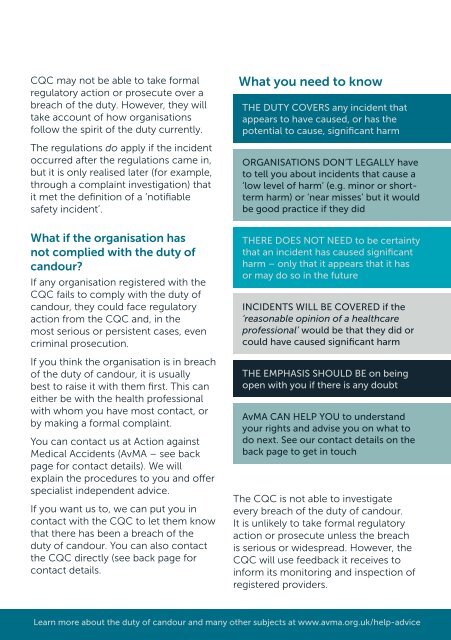The Duty of Candour
Duty-of-Candour-2016
Duty-of-Candour-2016
You also want an ePaper? Increase the reach of your titles
YUMPU automatically turns print PDFs into web optimized ePapers that Google loves.
CQC may not be able to take formal<br />
regulatory action or prosecute over a<br />
breach <strong>of</strong> the duty. However, they will<br />
take account <strong>of</strong> how organisations<br />
follow the spirit <strong>of</strong> the duty currently.<br />
<strong>The</strong> regulations do apply if the incident<br />
occurred after the regulations came in,<br />
but it is only realised later (for example,<br />
through a complaint investigation) that<br />
it met the definition <strong>of</strong> a ‘notifiable<br />
safety incident’.<br />
What you need to know<br />
THE DUTY COVERS any incident that<br />
appears to have caused, or has the<br />
potential to cause, significant harm<br />
ORGANISATIONS DON’T LEGALLY have<br />
to tell you about incidents that cause a<br />
‘low level <strong>of</strong> harm’ (e.g. minor or shortterm<br />
harm) or ‘near misses’ but it would<br />
be good practice if they did<br />
What if the organisation has<br />
not complied with the duty <strong>of</strong><br />
candour?<br />
If any organisation registered with the<br />
CQC fails to comply with the duty <strong>of</strong><br />
candour, they could face regulatory<br />
action from the CQC and, in the<br />
most serious or persistent cases, even<br />
criminal prosecution.<br />
If you think the organisation is in breach<br />
<strong>of</strong> the duty <strong>of</strong> candour, it is usually<br />
best to raise it with them first. This can<br />
either be with the health pr<strong>of</strong>essional<br />
with whom you have most contact, or<br />
by making a formal complaint.<br />
You can contact us at Action against<br />
Medical Accidents (AvMA – see back<br />
page for contact details). We will<br />
explain the procedures to you and <strong>of</strong>fer<br />
specialist independent advice.<br />
If you want us to, we can put you in<br />
contact with the CQC to let them know<br />
that there has been a breach <strong>of</strong> the<br />
duty <strong>of</strong> candour. You can also contact<br />
the CQC directly (see back page for<br />
contact details.<br />
THERE DOES NOT NEED to be certainty<br />
that an incident has caused significant<br />
harm – only that it appears that it has<br />
or may do so in the future<br />
INCIDENTS WILL BE COVERED if the<br />
‘reasonable opinion <strong>of</strong> a healthcare<br />
pr<strong>of</strong>essional’ would be that they did or<br />
could have caused significant harm<br />
THE EMPHASIS SHOULD BE on being<br />
open with you if there is any doubt<br />
AvMA CAN HELP YOU to understand<br />
your rights and advise you on what to<br />
do next. See our contact details on the<br />
back page to get in touch<br />
<strong>The</strong> CQC is not able to investigate<br />
every breach <strong>of</strong> the duty <strong>of</strong> candour.<br />
It is unlikely to take formal regulatory<br />
action or prosecute unless the breach<br />
is serious or widespread. However, the<br />
CQC will use feedback it receives to<br />
inform its monitoring and inspection <strong>of</strong><br />
registered providers.<br />
Learn more about the duty <strong>of</strong> candour and many other subjects at www.avma.org.uk/help-advice



